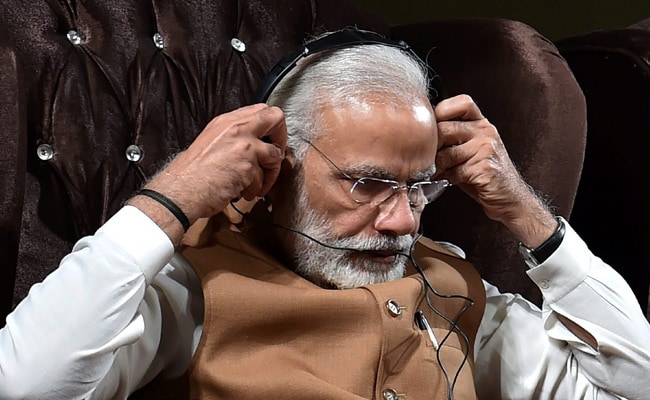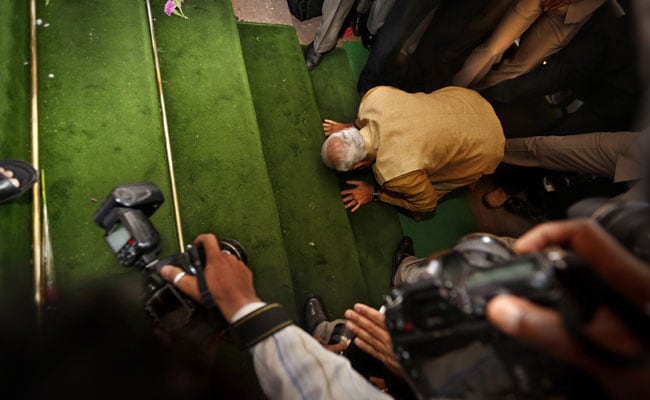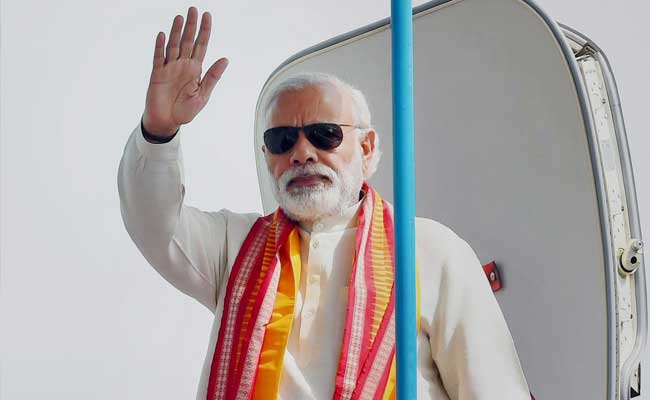The lead story quotes him as saying that he would "take the entire 125 crore people of India along". Has he? Let's see.
Two years on, we have had love jihad; ghar wapsi; bizarre and highly provocative statements by MPs, MLAs and even ministers of the ruling BJP that evoked only a studied and deliberate silence from the Prime Minister; the assassination of rationalists Govind Pansare and M.M. Kalburgi by probably the same Hindu extremist elements that had been threatening them repeatedly and for long; the horrendous lynching of Mohammad Akhlaque, making diet the touchstone of fidelity to our culture, leading, in turn, to the unprecedented spectacle of intellectuals, artistes and writers by the dozen returning their awards in protest against such intolerance; the packing of the Indian Council of Historical Research with weird pracharaks with even weirder notions of history; the undermining of the Film and Television Institute of India by appointing as Chairman a minor TV actor known principally for his Modimania, and infiltrating into the governing council a former President of the BJP's student wing with no claim to the visual arts media and a film-maker whose sole claim to fame was a documentary enticingly called Narendra Modi: A Tale of Extraordinary Leadership; suspending the Ambedkar-Periyar Study Circle at IIT, Guindy, Chennai; the suicide of Rohith Vemula and the shenanigans at the University of Hyderabad; then JNU, Kanhaiya Kumar, goonda lawyers and the appropriation of Bharat Mata ki Jai as the litmus test of patriotism; threatening Muslim dissenters, including Shah Rukh Khan, with deportation to Pakistan (!); Amit Shah proclaiming that firecrackers will burst in celebration in Pakistan if the BJP were defeated in Bihar; renaming Akbar Road...and so on and on.
Hence, it is as well to recall The Hindu's fateful warning in its front-page editorial on the morning after: "There is a huge trust deficit with the minorities, especially the Muslim community, which must be addressed" by upholding "the idea of India as a pluralist and inclusive landscape". The editorial went on: "the task ahead is to ensure that all Indians share that sense of belonging and participation in the national governing agenda". It was further underlined at page 14 that with just 22 Muslims having been elected, "the number of Muslims MPs in the 16th Lok Sabha will be the lowest in 50 years", and that "Muslims now make up just over four per cent of parliamentarians despite their accounting for 13 per cent of the population".

Has anything in the last two years addressed that "trust deficit"? Or has that deficit only been aggravated? And why? At page 10, the academic, Shiv Viswanathan, seemed to have stumbled on the answer, "Mr. Modi was the vehicle of the RSS," he wrote and added the cautionary tale, "One must call it an RSS victory also". Indeed, one might. For our social harmony as a nation has never been as tattered as it has been rent over the last two years of Hindutva sneaking into governance. Is this the way of taking along "the entire 125 crore people of India"?
The lead story then quoted Modi as saying in Vadodra, "The NDA has the full majority to form the government, but to run a country, it needs the support of all parties." What happened to that intention? Consider.
Notwithstanding the disgraceful behaviour of the BJP in Parliament during virtually the entire five-year tenure of UPA-II, the Congress, now in Opposition, set such a good example that more legislation was passed in the first six months of Modi's government than in years of BJP disruption through Dr. Manmohan Singh's second term. However, instead of acknowledging this and remembering that he needed "the support of all parties" to "run the country", as soon as the 2014 winter session of Parliament ended, Modi went on a spree of issuing ordinances. Clearly, the contempt for parliament that he had already demonstrated by failing to turn up in the house much of the time, and scorning, in particular, the Rajya Sabha, where the BJP was in a minority, was getting the better of the photo opportunity he had set up for himself by kissing the steps of the building when he made his first entry. The ordinances brought down on him a storm of protest from the opposition parties, particularly over the Land Acquisition ordinance.

Inspired by Rahul Gandhi's jibe against this "suit-boot sarkar", the Congress-led Opposition gave the BJP a taste of its own medicine. But instead of reaching across in response to secure "the support of all parties" as Modi had dimly perceived on the day of his triumph, his government thought they could brazen it out in the face of the opposition's grim determination. Eventually, they were forced to yield and, after re-promulgating the Land Acquisition ordinance three times, were left with no alternative to humiliatingly letting their ordinance lapse.
But still unable to escape their unilateralism, the GST constitutional amendment remains un-passed principally because Modi, Jaitley and their cohort do not know how to operate the levers of negotiation with their parliamentary opponents to work out the required modus vivendi. If we are having session after barren session, it is because Modi has forgotten his own injunction of taking "the support of all parties." He has also betrayed his avid supporter, Seshadri Chari, who, at page 11, claimed Modi "has jettisoned his aggressive image and displays a broad political outlook." No Prime Minister has been more aggressive, abrasive and vicious than Modi on the main opposition party and its leadership, the Gandhi family, not only in India but also repeatedly and abusively on foreign soil.
Seshadri also said, "All through the campaign, Mr Modi also asked for votes in the name of development, jobs, economic opportunity", and memorably added "His time to deliver starts now". For good measure, as reported at page 22, Modi, celebrating his electoral win, equated India with himself, tweeting: "Bharat ki jai. Ache din ane wale hain".
To go by comments from captains of industry splayed over page 16, the "Business" page, it is clear the business community was taken in. Among the most enthusiastic was Adi Godrej: "it is an excellent development for India...that one party has a majority in Parliament. It will enable bold and quick decisions." Two years later, a thoroughly disillusioned Adi Godrej has turned into the business community's leading critic of the Modi government's economic performance.

Sunil Bharti Mittal is quoted on the same page as saying the "need of the hour is to bring back business confidence and revive the investment cycle". The investment cycle is stuck. Manufacturing in most sectors is stagnant with low demand leading to huge unutilized capacity. Banks are bankrupt and credit off-take is at an all-time low. Exports have fallen for 17 straight months. The private sector waits and watches, investing massively abroad but not in India, knowing that the "good times" are yet to come.
Where ITC chairman YC Deveshwar had thought "a comprehensive and decisive mandate augurs well for spearheading a new paradigm of development", he must be deeply disappointed that the "optimism" he had hoped for "to encourage investments and spur growth" has been dashed to the ground. So too must Siddharth Birla, the FICCI President, be in despair that 24 months after he thought "the clear mandate would help the leadership restore the much-needed investor confidence, and attract higher investments and generate jobs, especially in the manufacturing sector", it is precisely in the manufacturing sector that there is no "investor confidence", no "higher investment" and, therefore, almost no scope to "generate jobs".
On The Hindu's Business page of 17 May 2014, the south Indian magnate, A Velayan, Executive Chairman, Murugappa Group, was "positive that the next 10 years will probably be a golden period for India: development-oriented and well-governed." Ha! Ha! Of course he added, "Once manufacturing starts growing" (but, alas, it hasn't) "that will kick off the country's GDP growth and generate employment". As explained in two previous columns, a statistical illusion has misled us into believing that India's GDP growth has been "kicked off" but Velayan's hope that then "manufacturing (will) start growing" has miserably failed to be realized. And what little manufacturing growth we have had is jobless growth. N Srinivasan, Vice Chairman, India Cements, thought "the government should give top priority to infrastructure development and ensure completion of pending projects." It hasn't.

Even Moody's assessment that "industrial momentum could pick up in the second half of the year (2014), as stalled investment resumes and consumer confidence increases" has turned out to be delusional: leave alone the "second half" of 2014, even in the first half of 2016, investment has not "resumed" and "consumer confidence" remains negative.
The time for hyperbole is over. Rekha Saxena of Chitrakoot in East Delhi might in 2014 have gushed at page 4, "We have started believing in Modi like God", but two years on must entertain some doubt about his divinity. And Seshadri Chari might once have believed that "this watershed moment in India's politics catapults India on a takeoff path", but, sorry, the flight has been aborted. And to Chari's chagrin, "the strong leadership of one individual who gave wings to the hope, aspirations and dreams of millions" languishes as a third of our people reel under drought, agrarian distress reaches un-scaled heights, and the youth find not only their education twisted, but also emerge from school and college with little or no prospect of finding employment. Seshadri has been let down. Modi's "time to deliver" is yet to commence.
(Mani Shankar Aiyar is former Congress MP, Rajya Sabha.)
Disclaimer: The opinions expressed within this article are the personal opinions of the author. The facts and opinions appearing in the article do not reflect the views of NDTV and NDTV does not assume any responsibility or liability for the same.


